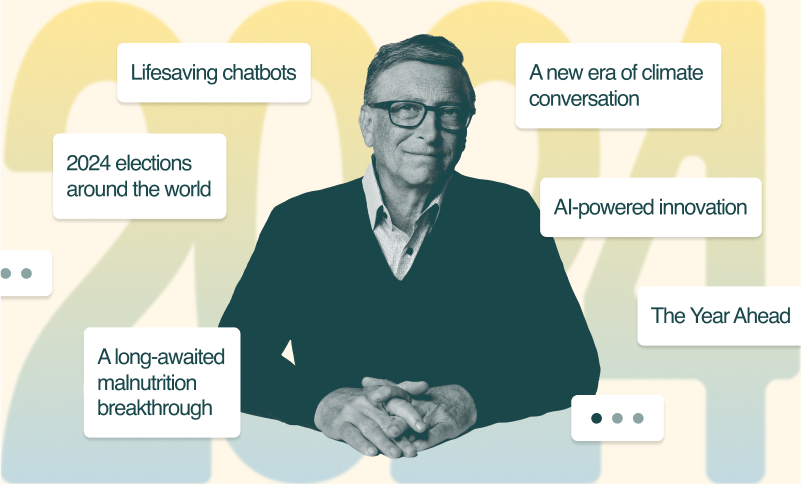Millions of viewers—myself included—are tuning in to The Daily Show because Noah’s show is every bit as good as Stewart’s.
Last month, during a trip to Europe, I mentioned that I plan to invest $1 billion in clean energy technology over the next five years. This will be a fairly big increase over the investments I am already making, and I am doing it because I believe that the next half-decade will bring many breakthroughs that will help solve climate change. As I argued in this 2010 TED talk, we need to be able to power all sectors of the economy with sources that do not emit any carbon dioxide.
But when it comes to preventing the worst effects of climate change, the investments I make will matter much less than the choices that governments make. In Europe I got to talk about these choices with several political leaders, and in this post I want to share the steps that I encouraged them to take.
I think this issue is especially important because, of all the people who will be affected by climate change, those in poor countries will suffer the most. Higher temperatures and less-predictable weather would hurt poor farmers, most of whom live on the edge and can be devastated by a single bad crop. Food supplies could decline. Hunger and malnutrition could rise. It would be a terrible injustice to let climate change undo any of the past half-century’s progress against poverty and disease—and doubly unfair because the people who will be hurt the most are the ones doing the least to cause the problem.
In addition to mitigating climate change, affordable clean energy will help fight poverty. Although the Gates Foundation does not fund energy research (my investments are separate), we see through our work with the poorest how the high price of energy affects them by adding to the cost of transportation, electricity, fertilizer, and many other things they need.
I do see some encouraging progress on climate and energy. Environmental advocates deserve credit for getting climate change so high on the world’s agenda. Many countries are committing to put policies in place that reflect the impact of greenhouse gases. The cost of solar photovoltaic cells has dropped by nearly a factor of ten over the past decade, and batteries that store energy created by intermittent sources like solar and wind are getting more powerful and less expensive. Since 2007 the United States has reduced its greenhouse gas emissions nearly 10 percent. Since 1990 Germany has reduced its energy-sector emissions by more than 20 percent.
World leaders will take another critical step this December at a major meeting in Paris called COP21, where they will discuss plans to reduce global CO2 emissions significantly. COP21 can build a strong foundation for solving the climate crisis—but we will need to go even further.
Scientists generally agree that preventing the worst effects of climate change requires limiting the temperature increase to 2 degrees Celsius, and that doing so requires the biggest emitters to cut emissions 80 percent by 2050 and all countries to essentially eliminate them by the end of the century. Unfortunately, while we can make progress with today’s tools, they cannot get us to an 80 percent reduction, much less 100 percent. To work at scale, current wind and solar technologies need backup energy sources—which means fossil fuels—for windless days, long periods of cloudy weather, and nighttime. They also require much more space; for example, to provide as much power as a coal-fired plant, a wind farm needs more than 10 times as much land.
These are solvable problems. If we create the right environment for innovation, we can accelerate the pace of progress, develop and deploy new solutions, and eventually provide everyone with reliable, affordable energy that is carbon free. We can avoid the worst climate-change scenarios while also lifting people out of poverty, growing food more efficiently, and saving lives by reducing pollution.
To create this future we need to take several steps:
1. Create Incentives for Innovation
One step is to lay the foundation for innovation by drastically increasing government funding for research on clean energy solutions. Right now, the world spends only a few billion dollars a year on researching early-stage ideas for zero-carbon energy. It should be investing two or three times that much.
Why should governments fund basic research? For the same reason that companies tend not to: because it is a public good. The benefits to society are far greater than the amount that the inventor can capture. One of the best examples of this is the creation of the Internet. It has led to innovations that continue to change our lives, but none of the companies who deliver those innovations would ever have built it. Similarly, the government’s research into hydraulic fracturing helped create today’s natural gas boom.
Expanding the government’s support for energy research will lead to another important step: attracting more private investment to the field. As early-stage ideas progress, private capital will pour in to build the companies that will deliver those ideas to market. We need hundreds of companies working on thousands of ideas, including crazy-sounding ones that don’t get enough funding, such as high-altitude wind and solar chemical (using the energy of the sun to make hydrocarbons). No one knows which of these technologies will prove powerful enough and easy to scale, so we should be exploring all of them.
My own personal investments include companies working on new batteries and other storage methods and advances in solar technology. The nuclear design I am investing in would be safer than previous designs and would go a long way toward solving the nuclear waste problem. I spend a lot of time with the CEOs and scientists at all these companies discussing how to build a business around an innovative idea and take a product to market. If government research budgets open up the pipeline of innovation, not only will I expand my investments, but I believe other investors would join me in taking these risks.
Governments need to act quickly, because energy transitions take time. Today, renewables account for less than 5 percent of the world’s energy mix. It took four decades for oil to go from 5 percent of the world’s energy supply to 25 percent. Natural gas took even longer. I believe we can make this transition faster—both because the pace of innovation is accelerating, and because we have never had such an urgent reason to move from one source of energy to another. The sooner we start, the more suffering we can prevent.
2. Develop Markets That Help Get to Zero
Another important step will be to ensure that the energy market accurately reflects the full impact of emitting carbon. Today the market is not factoring in what economists call the negative externalities—the health costs, environmental damage, and so on. If the market takes these into account, renewable energy will be more competitive with fossil fuels, which will attract more innovators to the field. Many countries and states are experimenting with different ways to price carbon. Whatever approach we take, it should create incentives to develop new energy solutions while also giving energy companies enough certainty to plan and execute the transition to zero-carbon sources.
We can also be smarter about how we use subsidies. The IMF estimates that direct subsidies for fossil fuels amount to nearly $500 billion a year worldwide, shielding consumers from their true costs. Some subsidies for deploying renewable energy are also very inefficient, creating big incentives to install solar panels where it’s often not sunny or wind turbines where it’s not windy. We should be looking for ways to reduce these subsidies and invest the savings in the basic R&D that will help solve the problem.
3. Treat Poor Countries Fairly
Unfortunately, even if we could roll out the ideal zero-carbon solution tomorrow, some climate change is inevitable, and it will hit the world’s poor the hardest. The countries that have done the most to cause this problem have a responsibility to not only invest in mitigation, but also help poor countries adapt to a changing climate. For our part, the Gates Foundation is concentrating on one key aspect of adaptation: helping small farmers—who make up the majority of the world’s poor—adjust to hotter, more unpredictable weather by raising agricultural productivity. I will be writing more about this work later this year. [Update on 9/8/15: As promised, here’s the post.]
As for next steps, I’m optimistic that the spotlight of the COP meeting in Paris will help motivate governments to step up their research budgets. In my view, innovation is essential to human progress. Some people would say that it is the lens I use to look at every problem, and I have to admit that there is some truth to that. But I believe it is justified by history. In my lifetime innovation has helped eradicate one deadly disease (smallpox) and put us on the brink of a second (polio). We have cut the fraction of children who die every year by a factor of four. Digital technology has revolutionized the way people live. We can create a zero-carbon future too, if we commit to it.





